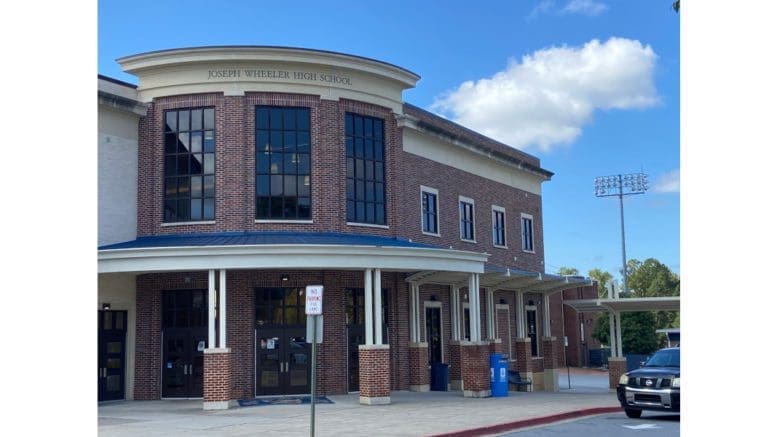By Rebecca Gaunt
Two Joseph Wheeler High School students joined a virtual panel Thursday, hosted jointly by the Southern Poverty Law Center and the Atlanta Mayor’s Office of Cultural Affairs, to discuss the fight for a new school name.
The roundtable was on public art, politics and Confederate symbols in Georgia. AJ Sanders and Harini Vijay spoke on behalf of the Wheeler Name Change group, which comprises students, teachers and community members advocating for the Cobb County high school to have the Confederate general’s name removed. The group wants a new name selected with input from the community.
“Today, as one of the most diverse high schools in Georgia, we are working to rename our school so that it is representative of the diversity of our student body and the values that we represent,” Sanders said.
The Wheeler group caught the attention of SPLC Chief of Staff Lecia Brooks when its efforts made the news earlier this year.
“They were not only denied the chance to speak, but ignored by their elected leaders in Cobb County government,” Brooks said.
After three failed attempts by Wheeler students to have their presentation in support of the name change added to the school board agenda, they signed up for all the public speaking slots at the April meeting and gave the presentation in increments.
A summer email campaign by the group recorded that each board member received 22 emails from students within the initiative, but only three of seven board members (Tre´Hutchins, Jaha Howard and Charisse Davis) acknowledged the emails and “gave meaningful responses.” They said they did not receive responses from Chairman Randy Scamihorn, Brad Wheeler, David Banks or David Chastain.
The group’s research, videos of public comments, and a timeline of its advocacy can be found on its website. A petition in support of the change currently has more than 5,400 signatures.
According to Brooks, Georgia leads the nation with 45 schools named after Confederate leaders. The SPLC reached out to Superintendent Chris Ragsdale and the board in support of the name change.
“Forcing students, especially students of color, to encounter Confederate imagery and learn in spaces honoring those who fought to continue the inhumane enslavement of human beings, as well as keep Black people uneducated, is cruel and psychological punishment,” Brooks said.
Vijay said the current naming rule states that a namesake must have made a significant educational, historical, or social contribution in the community, but Wheeler has more significant ties to Alabama, where he was an elected representative, planter and lawyer.
“Joseph Wheeler does not fit this criteria. Furthermore, the current naming policy provides rules that the names of new institutions must adhere to, but it does not outline criteria for the renaming process of previously existing institutions, whereas, neighboring counties Clayton, Fulton, Gwinnett, and even Marietta City Schools all have guidelines…Cobb County’s policy simply states that this task is left to the discretion of the superintendent with minimal community input,” Vijay said.
Additionally, they argue, the name was selected in 1964 in response to integration and was “likely intended to be somewhat antagonistic.”
Vijay said opposition often comes from people who say it is an attempt to erase history.
“Joseph Wheeler and his role in history is not unacknowledged. The Civil War and its impact on American history is included in the curriculum in our schools. But when our school was named, it was put in writing and made clear what chapter of Wheeler’s history they were choosing to honor,” she said.
The panel also included multidisciplinary artist Lisa Tuttle who uses art to examine race and racism in the American south. Her works, including a reimagining of Stone Mountain’s carving of Confederate leaders carrying white flags of surrender, are on display at Atlanta’s Gallery 72.
Panelist and state Rep. Billy Mitchell (D-Stone Mountain) is the sponsor of HB 277 to end the maintenance of the Stone Mountain Confederate sculpture. Georgia is one of six states with strict preservation laws to prevent the removal of Confederate monuments.
“I’m told Stone Mountain Park spends literally tens of thousands of dollars a year to make certain that the overgrowth does not obscure the carving in the mountain,” he said.
He also said, “The students from Wheeler High School–they give me so much hope. This is why I do believe it’s just a matter of when, and not if.”
